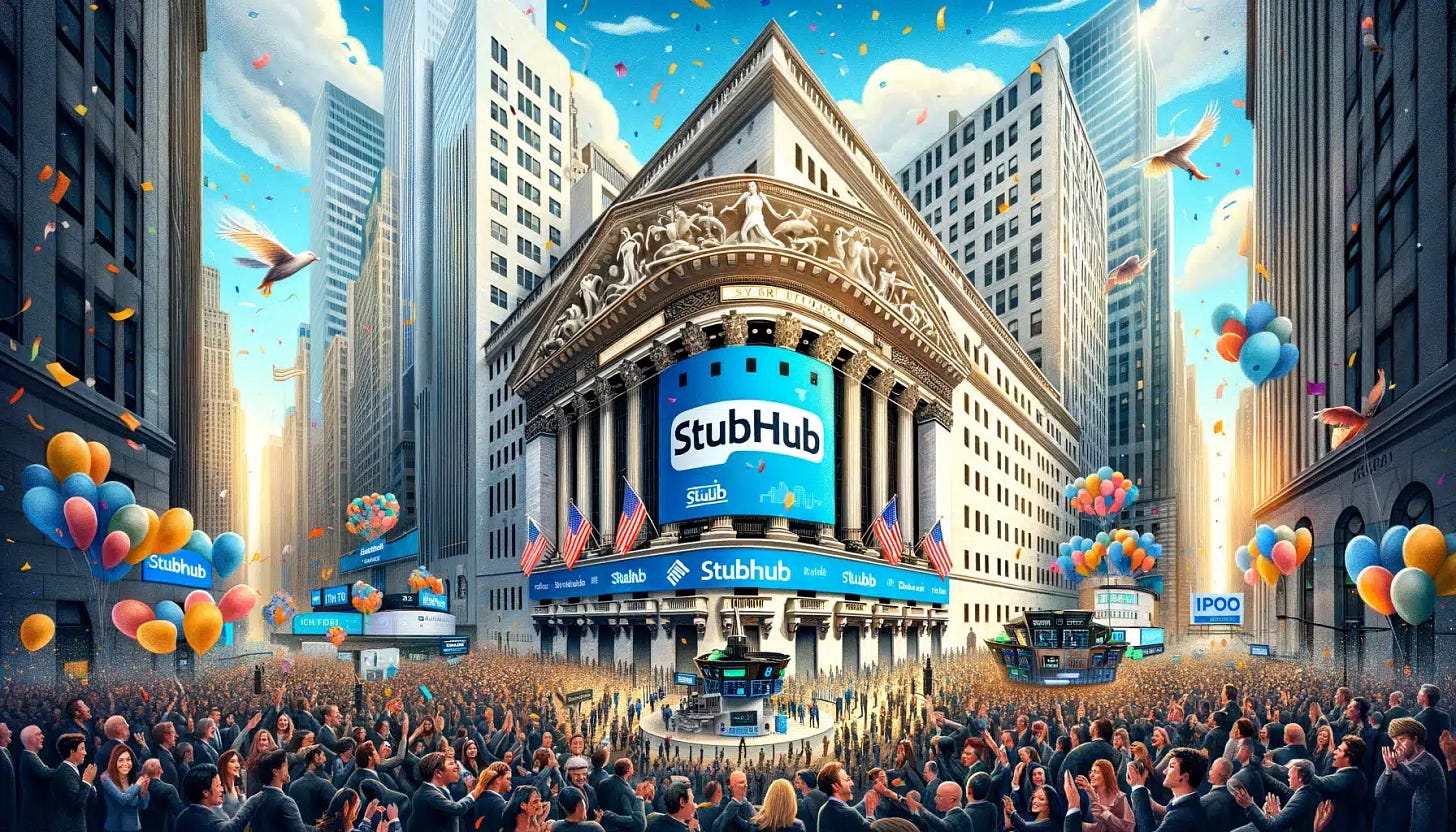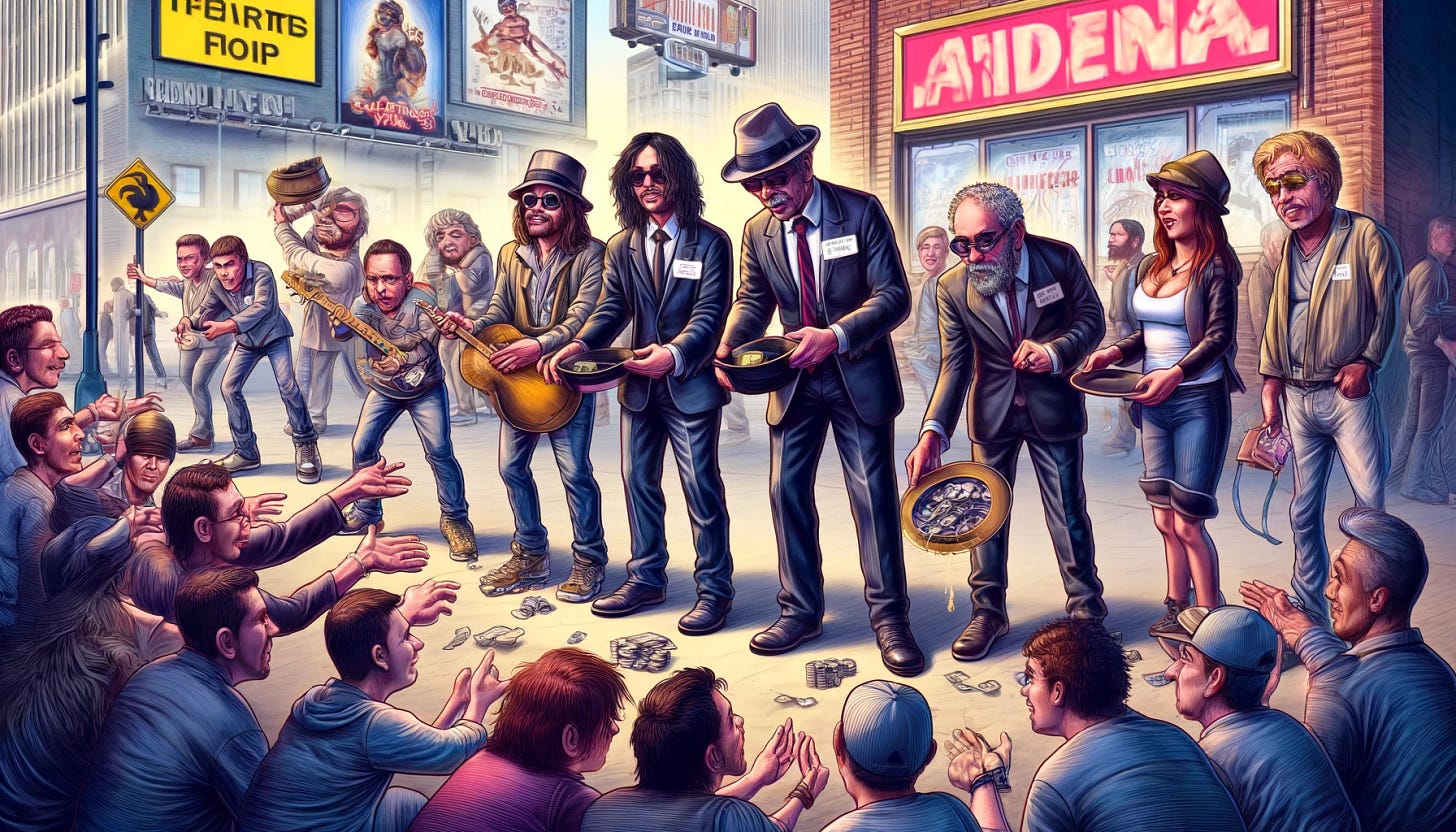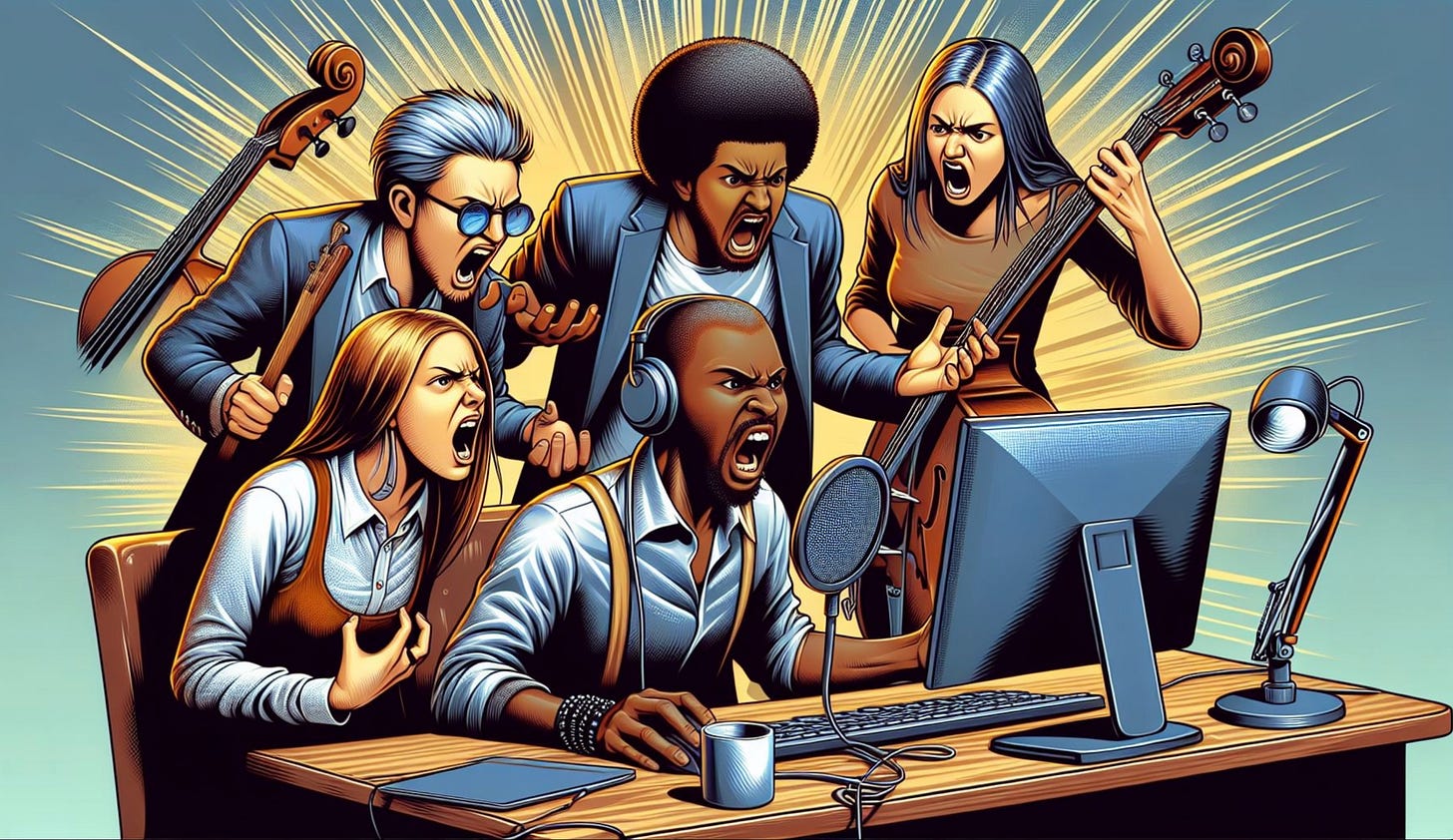Spotify's Supremium is dead; StubHub is going public; Superfans vs Superprofits; and other stuff.
Read this to make people believe you're interesting and knowledgeable
Spotify was ready to launch its HiFi product when Apple Music and Amazon Music stole their thunder and offered lossless music at no extra cost; Spotify continued its years-long delay of rolling out HiFi music and considered a premium tier.
I wrote about Spotify Supremium last September:
Well..
Supremium is dead.
Unless Spotify is playing with us, there will not be a Supremium plan anymore.
So, in its place, welcome the super creatively named Music Pro.
The difference: instead of being offered as a different plan, Spotify calls it an add-on.
I believe the add-on terminology is psychological, to encourage adoption rather than offer an entirely new plan.
No info about its price.
A "Your Music Pro" button will appear on the sidebar, just like the "Your Plan" button.
Confirmed features in Music Pro:
Advanced Mixing tools
The basic premise remains the same as before, but I have more on that a little later.
Filter your library by mood, activity, genre
Lossless Audio
Up to 24-bit/44.1 kHz FLAC
The playback quality will be displayed while listening, similar to what you see in Apple Music.
Headphones Enhancement
You will be able to select your headphone (or AirPods) model and "lift your headphones’ performance using patented technology"
I say this as someone who has greatly benefited from my previous work at Spotify, but this is all incredibly underwhelming. I’m among the minuscule amount of users who care about lossless audio, but this seems like such a half-baked idea. Spotify has become one big beta test, and fragmented chaos reigns supreme.
StubHub is Going Public
StubHub is planning to go public by late summer. How exciting! And what's more, it's loaded with over $2 billion in debt — many times its estimated profits. Nothing like testing investors' appetite for companies with strained balance sheets, right?
But wait, it gets better.
StubHub has ambitious hopes for its valuation, aiming for $16.5 billion. And if it can't get close to that number, it indicates it will just call off the public listing like it's no big deal.
Despite its high debt-to-profit ratio, StubHub has seen a boost in its business thanks to the post-pandemic boom in sports and live concerts. According to credit analysis reports by Moody's Investors Service, the company generated about $1.4 billion in revenue in the year ending September 2023, up by 40% from the previous year.
Moody's Investors Service estimated that StubHub would generate around $1.7 billion in revenue this year. But executives want investors to value StubHub like Airbnb, at a multiple of more than nine times this year's expected revenue. StubHub's valuation is steep compared to its rival, Vivid Seats. Vivid Seats trades at only 1.4 times its expected revenue this year. But hey, who cares about that when StubHub has about $1 billion in cash, excluding debt? It could always put off the IPO if it doesn't get the desired valuation.
So, there you have it. StubHub: the company with high debt, ambitious hopes for their IPO, and a willingness to call off said IPO. What could go wrong?
Spotify Will Allow Users to Remix Songs
Spotify, as previously mentioned, is developing tools allowing subscribers to edit their favorite songs, such as speeding them up or mashing them up. This move aims to cater to Gen Z and increase user engagement while generating new revenue for artists. Spotify's exploration of these tools follows a scramble among music and tech executives to ensure artists and labels can continue to make money even as the way fans consume music evolves.
Under the plans Spotify is discussing, rights holders such as labels, publishers and artists (hey, someone remembered you) would be compensated when fans stream modified versions of their music on Spotify.
The new tools could function as a playback feature, with users deciding which speed to listen to a song. More advanced song-modification features could be part of Spotify's new, higher-priced tier add-on.
Notable: Users would be allowed to share their modified tracks across Spotify but not on outside platforms such as social media apps.
TikTok Testing Virtual Influencers for Advertising
TikTok is reportedly working on a new feature that would use artificial intelligence to generate avatars or virtual influencers to star in videos and potentially compete with human creators for ad deals.
The feature is still under development, but it would generate a script for a video ad based on a prompt submitted by the advertiser. An AI-generated influencer would perform in the video. TikTok Shop merchants could also use the AI influencer tool to promote their goods.
However, according to those with knowledge of the project, the virtual influencers are not yet ready for release; testing shows the videos generate far fewer e-commerce transactions than those created by human influencers, one said. TikTok is treading carefully to avoid antagonizing its army of TikTokers, who have helped attract the app's 170 million U.S. users and are now playing a key part in its expansion into e-commerce.
I predict that in the not-so-distant future, these AI salespeople will not only look more realistic, but they’ll be armed with all of our data, so their pitches are tailored just for us. It will be a 1:1 experience that becomes better and better at using psychological warfare to open our wallets.
Yay.
Superfans vs. Superprofits
The Struggle to Cash In on Music’s Most Loyal Listeners
Labels, streamers, and promoters are all desperate to find ways to make superfans spend more money on music + merch. Despite their efforts, it's a challenging task, and their approach (thus far) seems shortsighted. Everyone wants to tap into the hype around superfans, from Warner Music Group and Universal Music Group to Spotify and Korean fan platform Weverse.
The enthusiasm for superfans began after Goldman Sachs projected that superfans, defined as listeners who “engage with artists and their content in five-plus different ways," could inject over $4 billion into the music industry by 2030.
Monetizing superfans is easier said than done. The music industry struggles to fully monetize its own content, unlike gaming, which generates new revenue streams more easily.
"People are trying to find a simple way to mine fandom," says Mike Pelczynski, one of the architects of SoundCloud’s “fan-powered royalties." Every platform is different, and there is no one-size-fits-all solution. And it’s painfully clear that the focus has been on extracting more money from superfans, rather than building meaningful connections.
Bernie Cahill, founding partner of Activist Artists Management, believes that taking care of superfans is far more valuable than selling them expensive merchandise. Superfans want to be closer to, and seen by, their favorite artists. They gain from their connections with like-minded enthusiasts, participating in the community around their favorite acts.
Historically, labels excel at reaching passive fans, making songs ubiquitous and inescapable for casual listeners. However, in the age of artist empowerment, it's hard to imagine many acts ceding control of their superfan communities to record companies. And if you are, stop!
Artists tend to amass a dedicated following before they sign to a label. This gives them a lot of sway in contract negotiations, and as a result, 360 deals, where labels take a share of the money that artists make from touring and merchandise sales, are out of favor with young managers and lawyers. Record companies' ability to cash in on superfans' passion is limited, and every approach I’ve read about or been told about seems dated and just… inauthentic. Par for the course, I guess.
Udio Strikes a Chord
This week, Udio, an AI music generation tool developed by a group of former DeepMind employees, went viral for its impressive ability to produce high-quality songs from simple text prompts. Apparently, one inspired by Dune is especially popular, but I hate Dune, so I can’t comment.
While many celebrated this groundbreaking innovation, some musicians on Reddit (see: unsuccessful ones) lost their shit. They expressed concerns about the implications for the music industry but mostly melted down about being replaced.
But let's face it: people have been freaking out over advancements in AI for years, yet people still find jobs and thrive. Recently, the AI sky has fallen for writers, but I know many on this platform who make big money. The truth is quality is what truly matters.
If you're worried about being replaced by AI, stop wasting your time complaining on Reddit and start focusing on improving your craft.
THE NEWS DESK
Music, Media, & Entertainment
Nicole Brown Simpson and Ronald Goldman’s murderer died a comfortable death in old age that they were denied. Read More → reuters
Jay Z’s Made In America Festival cancels for the second year in a row.
Read More → pollstarPop song lyrics are now angrier, much more repetitive, and more vain, according to new research. Experts say social media’s impact is inarguable.
Read More → wiredMeta Platforms announced new tools to protect against unwanted nude images and sextortion on Instagram, following pressure from media, politicians and child safety groups over the safety issues for young people using the app.
Read More → instagramSubstack-ers can now distribute podcasts on Spotify, the companies announced on Thursday. Don’t worry, I won’t be one of them.
Read More → spotifyTaylor Swift’s songs have returned to TikTok after a ten-week hiatus caused by the dissolution of licensing talks between Swift’s publisher and distributor, Universal Music Group, and TikTok. I was going to write more about this, but it’s Taylor Swift, so you can easily find 28492 articles about it if you want to understand how she made this happen.
Read More → varietyYouTube stars Dude Perfect, apparently known for trick-shot videos, will receive a $100M investment from Highmount Capital to “pursue bold new opportunities and projects.” Sigh.
Read More → hr
E-Commerce & Retail
McDonald’s has deployed an ad campaign featuring scented billboards that smell like its french fries.
Read More → adweekNike designed a sneaker specifically for breakdancing in the run-up to its inclusion in the Paris Olympics.
Read More → complexUber Eats is getting its own vertical video feed to help restaurant discoverability on its platform.
Read More → techcrunch
Tech, Web3, & AI
X is now automatically changing mentions of Twitter.com to X.com, but it’s creating a lot of unintended consequences—like opportunities for scammers.
Read More → qzTikTok has officially announced “TikTok Notes” — an image-focused app to rival Instagram.
Read More → tubefilterInstagram started rolling out a “Notify” sticker this month for creators to alert their fans when they post on the app. Followers can select which content, such as Stories, Reels, and posts they’d like to get notifications for.
Read More → softonicThe solar eclipse worked wonders for the chronically online: internet traffic was down over 40% across states in the path of totality when the moon blocked the sun. Read More → cloudflare
22 million AI-assisted papers have reportedly been submitted by students. We’re now deep in the era of the AI essay. Read More → wired
AI startup Humane releases its widely anticipated Ai Pin, a wearable badge that doubles as an AI-powered smart device.
Read More → techcrunch
Misc.
Philadelphia Eagles and Green Bay Packers will kick off 2024 NFL season in the league's first-ever game in Brazil.
Read More → nbc$300k in stolen legos were discovered by police in LA.
Read More → ktlaRobots are entering the meat-packing industry, automating a sector of famously difficult jobs. Read More → wsj
Deep Reads
Forgotten Events in American History
The worst maritime disaster in American history was overshadowed by the death of John Wilkes Boothe. The worst industrial accident in American history lost news coverage to Jackie Robinson’s baseball debut. A strange signal from outer space that some believe may have been a sign of extraterrestrial life took a back seat to media coverage of Elvis’ death.
Read More → kiteandkeyYes, Social Media Really Is a Cause of the Epidemic of Teenage Mental Illness Social psychologist Jon Haidt dissects how social media is a verifiable cause of the epidemic of teen mental illness. Read More → afterbabel
The Loneliest House in the World
A look into a house on a remote Icelandic island with no electricity or running water, but a sauna and puffins for neighbors.
Read More → ad
















